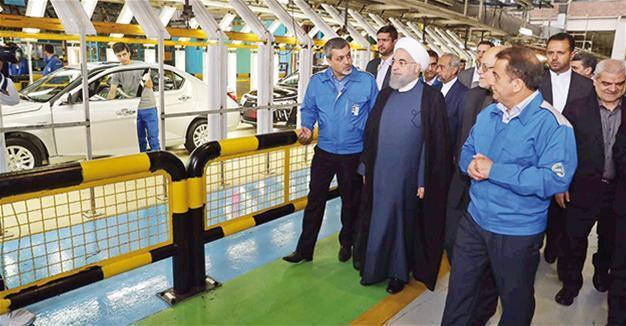Absent from US, French cars drive into Iran polls
 French carmakers PSA and Renault are turning their U.S. absence into an Iranian advantage by piling into a resurgent market still off-limits to foreign rivals fearful of sanctions under Donald Trump’s administration.
French carmakers PSA and Renault are turning their U.S. absence into an Iranian advantage by piling into a resurgent market still off-limits to foreign rivals fearful of sanctions under Donald Trump’s administration.The French investment has been seized upon by Iranian President Hassan Rouhani, who is seeking re-election this week, as evidence that his pursuit of a nuclear detente and attempts to attract foreign money will pay off for the economy.
PSA - the maker of Peugeots and Citroens - and Renault have pushed hard into Iran since its 2015 deal with world powers that saw international sanctions lifted in return for curbs on Tehran’s nuclear activities. PSA has signed production deals worth 700 million euros ($768 million), while Renault has announced a new plant investment to increase its production capacity to 350,000 vehicles a year.
The French companies, unlike their German, American and Japanese competitors, do not have manufacturing or sales operations in the United States. This makes them less vulnerable to penalties for any violation of U.S. sanctions still in force which ban financial transactions with Iran.
The prospect of a hardened U.S. stance under President Trump - a consistent critic of the nuclear deal - has deepened the caution of carmakers with large American exposures.
Germany’s Volkswagen and BMW are among those that have put Iranian ambitions on hold, industry sources told Reuters.
“We’re well aware of the market potential in Iran but we can’t afford to take any risks,” said a source close to VW. The company declined to comment on specific investment discussions.
PSA and Renault declined to comment on their Iranian businesses for this story, but PSA’s Middle East chief Jean-Christophe Quemard said earlier this year that the renewed U.S. pressure under Trump was helping his company stay ahead of foreign rivals who were holding back.
“This is our opportunity to accelerate,” he added.
Iranian car sales jumped 50 percent in the first quarter of 2017, according to data provider IHS Automotive, with models from Peugeot, Renault and Iran’s SAIPA showing solid gains.
Tehran car salesman Mehdi Monfared, whose dealership mostly sells domestic manufacturer Iran Khodro’s namesake brand, said he had witnessed an “explosion” in demand in recent months.
“People are being less careful with their money and are spending their savings on cars,” he told Reuters by telephone. “And the banks are lending.”
Rouhani pushed the French investment to the forefront of his election campaign when he attended a ceremony this month to mark the production launch of the Peugeot 2008, the first product of post-sanctions manufacturing deals with foreign carmakers.
“Now we can see that auto industry sanctions have been lifted, joint venture agreements concluded and a new car is being built,” he said.
PSA and Renault have moved swiftly to sign new production deals to upgrade their pre-sanctions partnerships with Iran Khodro and SAIPA. PSA plans to add more Peugeot and Citroen models in coming months, while Renault has introduced its Sandero compact alongside the Tondar sedan.
By contrast VW, which had been considering a production tie-up with Iran’s Mammut Khodro, has put the talks on the backburner because of the uncertainty, according to the source close to the group.
















